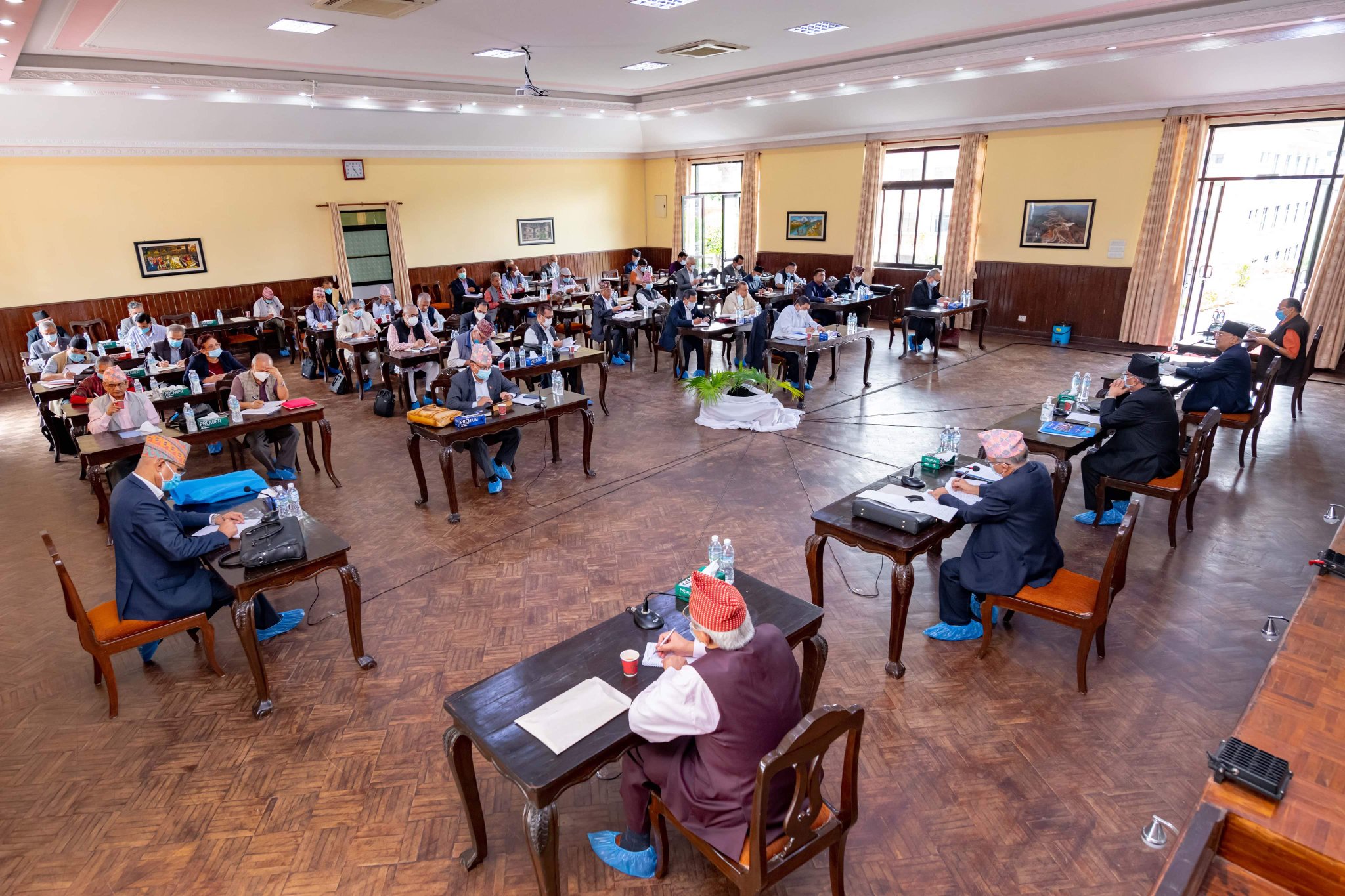Politics
Ruling party tug-of-war ends, but leaders wonder how long truce will last
Proposal by chairs Oli and Dahal commits a lot while failing to address some key issues, so irritants are likely to emerge sooner rather than later, insiders say.
Tika R Pradhan
Seven weeks of tug-of-war in the ruling Nepal Communist Party finally seems to have ended.
The players, however, have switched sides. Pushpa Kamal Dahal has now once again extracted “executive chairman” status and sided with chair KP Sharma Oli, leaving Madhav Kumar Nepal and Jhala Nath Khanal seething.
When the party held its Standing Committee meeting on June 24, Dahal, Nepal and Khanal were baying for Oli’s blood, demanding his resignation both as party chair and prime minister.
The Standing Committee meeting concluded on Friday, eighty days later, saying the party has managed to iron out all major differences.
“Dahal will look after the party works with executive powers while Oli will focus on the government,” Narayan Kaji Shrestha, the party’s spokesperson, told the media after Friday’s meeting. “Now the government will run under the party’s guidelines.”
The meeting also endorsed a joint proposal by chairmen Oli and Dahal.
According to Shrestha, the party won’t interfere in the daily works of the government, but important policies and matters of national importance are decided as per the party’s guidelines.
The party has decided to hold a unity national convention on April 7-12 next year for which the party's central committee meeting will be held on October 31-November 2.
On the Millennium Challenge Corporation Nepal Compact, according to Shrestha, the party decided to endorse it with revisions and it will arrive at a conclusion on the issues that require revisions, considering a report presented by the Khanal-led three-member panel.
Leaders said the party may have managed to avoid a split for now, but irritants will continue to emerge in the coming days because as of now everything seems to be pro-tem management.
They believe that the two chairmen have agreed for a truce for various reasons, including the Covid-19 pandemic.
“It’s just a truce for some time,” said Matrika Yadav, a Standing Committee member close to Dahal. “Given the nature of the prime minister and the way he tends to work, I don’t think this peace in the party is likely to last long.”
The new agreement is in line with the understanding that the two chairs had reached back in November last year.

Oli and Dahal on November 19 had agreed that the former would lead the government for the full term and the latter would run the party as “executive chairman”. Days after the understanding, Oli, in an interview with Kantipur Television, said that he was not only the “other executive chairman” but also senior to Dahal, in a clear indication that it was him—and not Dahal—who would call shots in the party. And he continued to do so—running both the party and the government—much to Dahal’s chagrin.
An infuriated Dahal then started forging an alliance with leaders like Nepal, Khanal and party vice-chair Bamdev Gautam.
After months of exercise, the Dahal faction emerged strong both in the Secretariat and the Standing Committee and started to pile pressure on Oli to resign.
Days after the Standing Committee meeting began with calls growing louder for Oli’s resignation, Oli prorogued Parliament on July 2 and launched charges against his opponents, saying they were trying to unseat him. While Oli engaged Dahal—both held a series of negotiations—he managed to win over Gautam, strengthening his position in the Secretariat. A task force formed by the two chairs suggested that there was no alternative to an agreement between them to save the party unity.
“It depends on how long the ceasefire between the two chairs holds,” said Leelamani Pokhrel, a Standing Committee member. “Whether the agreement between the two leaders is duly implemented will define the future course.”
Even though the party has decided to hold the unity convention on April 7-12 next year, leaders doubt it can happen given the uncertainties surrounding the coronavirus pandemic.
Madhav Nepal, who had sided with Dahal in his fight against Oli’s unilateral working style, has cautiously supported the proposal presented by the chairmen, saying the deadlock needed to end in light of rising coronavirus cases.
Nepal has been demanding that the ‘one leader, one major responsibility’ rule must be implemented.
A leader close to Nepal said they will wait and see if Oli abides by the party’s decisions.
Among the 13 leaders who spoke on Friday, most of them supported the proposal with criticism, saying many issues have not been properly addressed.
“This proposal failed to reflect and define the party’s ongoing political and ideological struggles, but we have managed to defuse the raging enmity,” a Standing Committee member quoted Khanal as telling the meeting.
“It was seen as the fight between two chairs. But that was not the case. It also reflects the class struggle of our society and the proposal has failed to address that.”
Leaders say the good thing after Friday’s meeting is the party has averted a disaster. But only time will tell whether the leadership complies with the agreement and upholds the promises in true spirit, according to them.
Raghuji Pant, a Standing Committee member, said he had told Friday's meeting that the fight for a system in the party has not been over.
“My take was that the proposal by the two chairs has led the party towards a truce,” Pant told the Post. “The ongoing struggle for the system and ensuring that procedures are duly followed will, however, continue.”




 16.12°C Kathmandu
16.12°C Kathmandu















